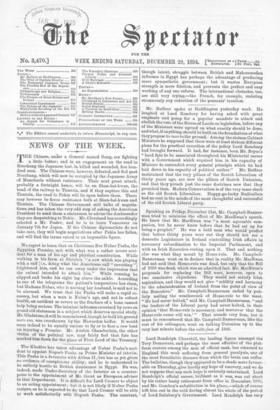Speaking on Friday, December 21st, Mr. Campbell-Banner- man tried to
minimise the effect of Mr. MaoE wan's speech. He knew that Mr. MacEwan was "a most agreeable com- panion, but he never knew before that he had set up for being a prophet." He was a bold man who would predict that before thirty years were out they should not see a domestic Legislature in Ireland controlling Irish affairs in necessary subordination to the Imperial Parliament, and with an Irish Executive resting upon it. That and nothing else was what thay meant by Home-rule. Mr. Campbell- Bannerman went on to declare that in reality Mr. MacE wan had not said that Home-rule was dead, but only that the Bill of 1893 was dead, which was an admitted fact. Mr. MacEwan.'e proposals for replacing the Bill were, however, open to two conclusive objections. They would not satisfy Irish aspirations, and they would not give "solidity and harmony to the administration of Ireland from the point of view of the Executive." Mr. Campbell-Bannerman ended by pub- licly nailing the weathercock of Home-rule to the mast. "He had never halted," said Mr. Campbell-Bannerman, "and the leaders of the Liberal party had never halted, in their opinion that Home-rule is necessary, and moreover that the Home-rule cause will win.'" That sounds very firm, but it must be remembered that Mr. Campbell-Bannerman, like the rest of his colleagues, went on talking Unionism up to the very last minute before the volte-face of 1886.


































